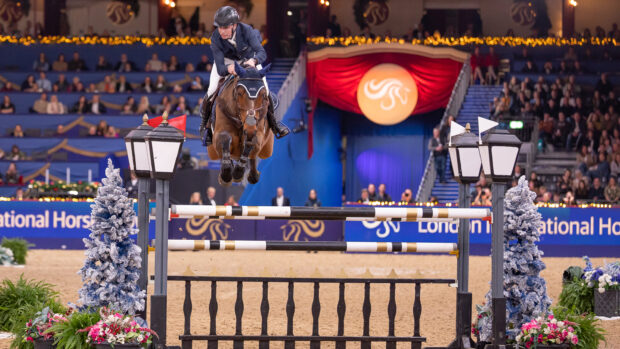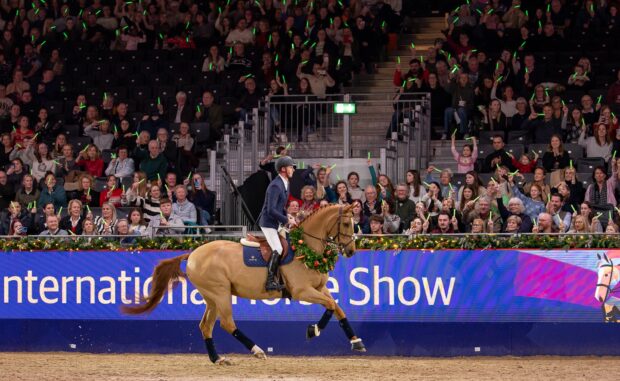A group of neglected ponies suffered “extensive” toxic burns leaving them with “crocodile-like skin” when their owner allowed them to fly-graze on land on which St John’s wort was growing.
John Darren Ware, 47, of Blakemere Crescent, Portsmouth, was sentenced at Portsmouth Magistrates’ Court on 12 August, having pleaded guilty to two animal welfare offences at a previous hearing.
On 28 July the RSPCA and World Horse Welfare attended council-owned conservation land in Farlington, Portsmouth, “heavily contaminated with dangerous weeds”, where eight ponies were grazing without permission. There was no evidence of additional hay, feed, or shelter.
An RSPCA spokesperson said three of the ponies had “extensive facial lesions” that were thick, raised, brown, and crusted, covering the muzzle and encircling both eyes, as well as raised crusting lesions over their bodies. The other five ponies had less severe lesions to their muzzles.
“The vet who examined the horses was concerned because of all the horses having similar lesions and suspected they had been in contact with a toxic substance,” said the spokesman, adding that tests revealed all eight ponies “were not in good health with evidence of inflammation and a chronic infection.
“The ponies also showed evidence of burns to the non-pigmented skin that is consistent with damage by UV light. The vet concluded that this was caused by exposure or contact with St John’s wort.”
The vet report said that certain weeds, like St John’s wort, contain “photodynamic agents that when the horse has contact or ingests the weed there is an exacerbated reaction to sunlight causing burns to the skin. This would be termed a primary photosensitisation.”
“Other weeds, such as ragwort, can cause damage to organs. The resulting damage prevents the filtering of photosensitive waste products so they are retained in other areas of the body, such as the skin, which causes what is known as a secondary photosensitisation,” read the report.
Tests showed that “no signs of the physiological impact of secondary photosensitivity so it was concluded St John’s wort had caused issues for the horses”.
The vet report added that horses suffering from photosensitisation should be removed from direct sunlight, prevented from further contact with the photodynamic agent, protected from the sun with shelter, and burns and injuries treated. It was also noted that burns around the muzzle are “particularly painful because it is highly sensitive.”
Hampshire’s RSPCA chief inspector Paul Williams said the RSPCA is grateful to World Horse Welfare for helping the ponies and that “thankfully they’ve now recovered”.
“Our plea to all animal owners is to make sure they always receive care and treatment they need when they need it. Animals are completely reliant on their owners to ensure their needs are met and they are kept safe and healthy,” he said.
World Horse Welfare field officer Penny Baker said “this was a truly horrific case”.
“I do not think I have ever seen ponies with so much crocodile-like skin around their muzzles. They must have been in excruciating pain,” she said.
“Keeping a horse or pony well is about much more than just food and water – it’s also making sure they do not have access to poisonous plants, can be protected from the elements and of course get prompt veterinary treatment when they need it.
“We are very grateful to the member of the public who alerted us to these ponies, and we were pleased to be able to work with the RSPCA to remove them from this appalling state of neglect.”
In mitigation, Ware was said to be unaware of the severity of the situation and thought it was sunburn. He said he had applied sun cream to one of the horses about a week before the visit by the charities but did not seek veterinary help.
Ware was banned from keeping equines for 10 years. He was ordered to pay £750 costs and a victim surcharge, and to carry out 15 rehabilitation activity requirement days.
The ponies were signed into the care of the RSPCA and went into private boarding for rehoming.
- To stay up to date with all the breaking news throughout Blenheim Horse Trials, Horse of the Year Show, London International and more, subscribe to the Horse & Hound website
You may also be interested in:

Pony found in ‘shocking state’ beside dead companion makes full recovery

Horses rescued from ‘field of death’ reunited with those who went to their aid

Subscribe to Horse & Hound magazine today – and enjoy unlimited website access all year round




